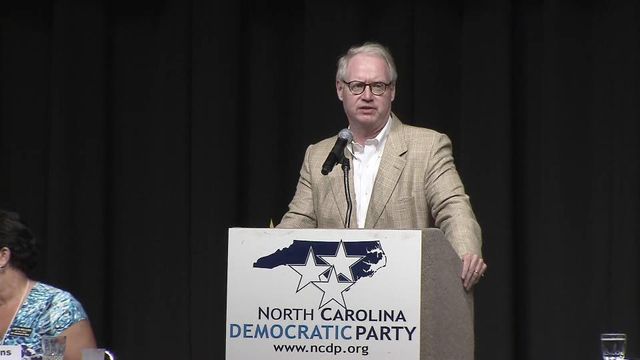Democrats fret about Parker's defiance
Some Democrats worry the party's inability to rid itself of an embattled chairman will hurt candidates in the general election.
Posted — UpdatedAt a chaotic six-hour meeting Saturday, Parker offered his resignation, then reversed himself when the state executive committee voted 269-203 to reject it.
A smiling Parker returned to the stage to thank the SEC for its support. "My friends, I resigned this morning but I abide by the will of the state executive committee," Parker said.
Supporters said Parker was the victim of a conspiracy by elected officials. Some said the conspiracy had to do with how party funding is divided. Others said Parker was scapegoated because the same-sex harassment scandal that happened under his leadership came to light just three weeks before a ballot initiative to ban same-sex unions.
Parker said he was pressured by elected leaders to refuse to serve.
"I will tell you there's been a lot of phone calls made. But this is our party," Parker said.
His decision humiliated those who publicly called for his resignation – especially the party's gubernatorial candidate Walter Dalton, who announced at that meeting that Parker WOULD step aside.
"As you know David is resigning as the chair of the party," Dalton told the committee in his opening remarks Saturday morning. "And he says he is committed – he’s indicated he’s committed to a smooth transition. I want you to know that this is a very selfless act."
In a statement Saturday evening, Dalton spokesman Schorr Johnson said the Lieutenant Governor was "surprised and disappointed" by Parker's move.
"David Parker had assured him that he would resign and assist in the smooth transition to a new chair. Clearly that did not happen," Johnson said.
A statement Monday from the Dalton campaign softened the message, calling the flap a distraction.
"Elections are about the issues and the candidates, and most voters don't know or care who the volunteer party chair is," Johnson said.
Voters may not care, but grassroots Democrats might, say some observers.
"I think it was a big slap in the face to Walter Dalton," said Greg Flynn, a Democratic activist who thinks Parker should have resigned. He says the divisive fight will hurt Democrats this fall.
Flynn called the conspiracy theories a smokescreen. "I think David Parker was buying time. He said he was going to resign, and he knew he had a period of time to round up the forces and come up with an alternative narrative."
Parker had been reportedly lobbying SEC members for weeks, but denied he engineered the dramatic spectacle.
"I had not planned on this at all," Parker said Saturday. "I came back because the people asked me to come back."
North Carolina State University political science professor Steven Greene called the situation "bizarre."
"A lot of people in politics are somewhat self-delusional. I think you almost have to be," Greene said. "I think [Parker] is perhaps significantly more self-delusional than most — the idea that hanging on to power this way can in any way be a good thing."
It could be a good thing for North Carolina Republicans, though.
"You have a rift between the Democratic party and the top-ticket Democrat in the state," said NCGOP spokesman Rob Lockwood. "That's a huge issue for their party overall with their messaging, with their fundraising, everything they do. So it plays into an advantage for us."
Parker said he believes the party will re-unite behind him within two or three days, calling the controversy a "tempest in a teapot."
"This Democratic party is united behind Barack Obama. This Democratic party is united behind Walter Dalton," Parker said Saturday. "The person who is the chairman in a lot of ways quite frankly is neither here nor there,"
Greene disagrees. "It's going to be more difficult to rally the troops to get the organization going because at the top of the organization, which is so central to the ground game in 2012, it's chaos right now," he said.
According to Greene, face-to-face communication is one of the most effective ways for parties and candidates to spread their message.
"That takes motivated volunteers getting out there every day, going door to door," Greene said. "This is the sort of thing where it affects your ability to get those motivated volunteers out there. And that can have a real negative impact on your electoral chances."
• Credits
Copyright 2024 by Capitol Broadcasting Company. All rights reserved. This material may not be published, broadcast, rewritten or redistributed.





